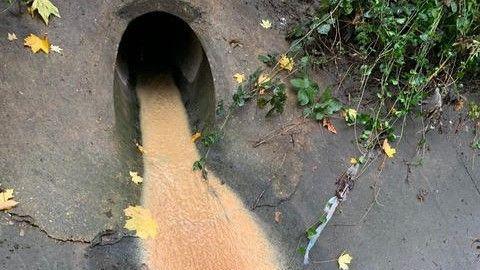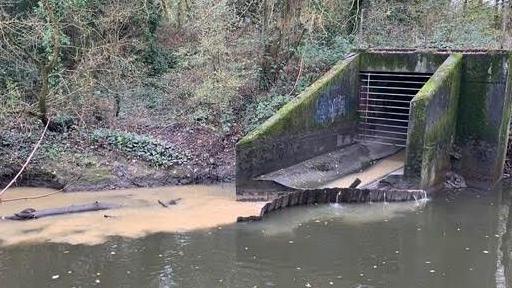More than 2,000 waste pipes misconnected in London

More than 2,000 foul waste pipes are misconnected to the surface water network in London, according to figures
- Published
More than 2,000 properties across London are illegally pumping raw sewage directly into rivers due to drainage misconnections, an Environmental Information Request (EIR) has revealed.
Over the past five years, Thames Water identified 2,294 misconnections in properties throughout London, according to the EIR submitted by the Local Democracy Reporting Service.
The misconnections, connecting foul waste pipes to the surface water network, are not caused by water companies but by incorrect plumbing work and are often not detected by inspectors.
Environmental charity Clean Up River Brent said the consequences were "very serious" and the waste was "destroying the building blocks of aquatic life".
Property owner liable
Clean Up River Brent's founder, Ben Morris, said the misconnections were "disastrous for nature" but getting the faults fixed was difficult.
He said: "By putting sewage, including both toilet waste and that from showers and washing machines, into rivers we are destroying the building blocks of aquatic life.
"Who wants to live next to, or visit, a stinking watercourse which gives no life or joy to wildlife or to humans?
"These mistakes are often not detected by building inspectors. They are usually only detected as a result of volunteer action – [through] witnessing polluted water going into a river."
In 2019, the Department for Environment, Food & Rural Affairs (Defra) estimated that between 150,000 to 500,000 of households in the UK may have some sort of misconnection.

More than 2,000 foul waste pipes are misconnected to the surface water network in London
Correcting a misconnection is the responsibility of the property owner, external.
Mr Morris said point of purchase building surveys often failed to detect misconnections, so new home owners may have a "nasty surprise".
He added: "For reasons of cost and convenience, owners often fail or refuse to do the necessary rectification work. In these circumstances the local authority is expected, but not obliged, to enforce the law and many simply fail to do this.
"As a result of this chain of failures it seems the number of misconnections in London is actually rising, making our rivers more and more polluted."
Misconnections are illegal but water companies do not have powers to enforce private properties to fix them, external.
Water companies can work with property owners and councils to get misconnections fixed voluntarily, but need support from local authorities to legally enforce unresolved cases.
Thames Water 'extremely stressed', warns boss
- Published15 July
Raw sewage from new homes being flushed into river
- Published18 November 2024
A Thames Water spokesperson said misconnected pipes had a serious impact on the environment.
"Most misconnections will have been done entirely by accident but is the responsibility of the property owner, which is why we would urge freeholders or developers fitting new connections to make sure they're plumbed in properly," they said.
"We have a programme of work to help identify and investigate misconnections and we also fund local projects across our region."
Mr Morris said builders and building inspectors should be liable "for errors they make or fail to detect".
He added that councils should appoint specialists to enforce any rectifications.
A spokesperson for London Councils, the organisation that represents the capital's boroughs, said misconnections were a "longstanding problem".
"Preventing misconnections relies on a range of actions – and compliance with building regulations is an important part of this," they said.
"London boroughs are under considerable resource pressure but continue to work with partner agencies and their communities to tackle this issue, including taking enforcement action where necessary."
Under statutory drainage and wastewater management plans, external from the Department for Environment, Food & Rural Affairs, water companies will work with local authorities and other stakeholders to understand the risks of misconnections and develop options to manage them.
Listen to the best of BBC Radio London on Sounds and follow BBC London on Facebook, external, X, external and Instagram, external. Send your story ideas to hello.bbclondon@bbc.co.uk, external